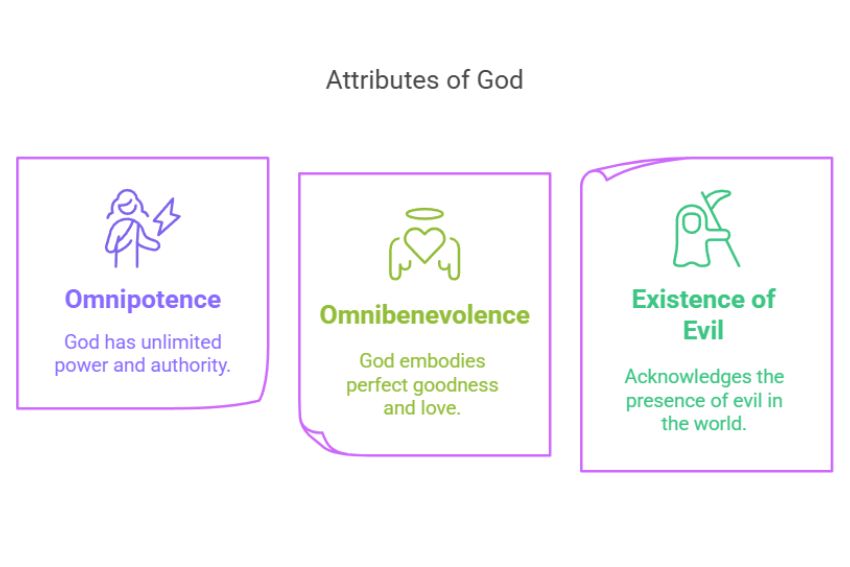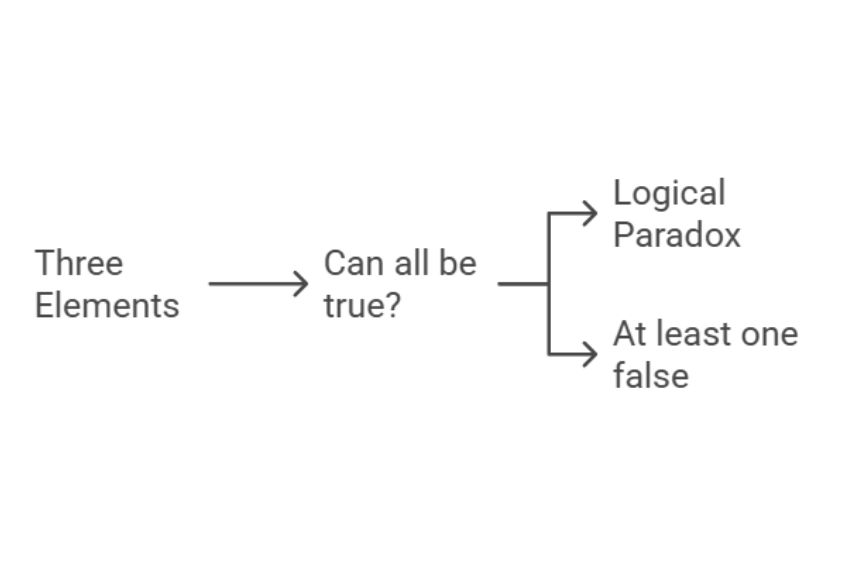Inconsistent Triad and the Problem of Evil: A Complete Guide
The inconsistent triad is a well-known philosophical argument that questions the existence of an all-powerful and all-loving God in a world where evil exists. This concept highlights a contradiction between three key statements:
- God is omnipotent (all-powerful).
- God is omnibenevolent (all-loving).
- Evil exists.
So, if God is truly all-powerful, He should be able to prevent evil. If He is all-loving, He would want to eliminate suffering. However, since evil exists, this raises a logical contradiction. Can all three statements be true at the same time? Or does one need to be false?
This argument was formally presented by J.L. Mackie, a philosopher who explored the problem of evil and its impact on religious belief. His work questions whether traditional views of God can be logically defended when faced with the reality of human suffering.
In this blog, we will explore what the inconsistent triad means, why it challenges religious philosophy, and how different arguments attempt to resolve this issue.

Historical Debates: Does Evil Contradict Theism?
The problem of evil is one of the most debated topics in philosophy and religious studies. It questions how a world created by an all-powerful and all-loving God can contain suffering, pain, and injustice.
Philosophers like J.L. Mackie argued that the existence of evil is incompatible with traditional theism. He suggested that religious believers must redefine God’s nature or change their understanding of evil to make sense of this contradiction. Others, like Alvin Plantinga, have defended God’s existence by claiming that evil is necessary for free will and moral growth.
Throughout history, philosophers have pointed to examples of natural disasters, disease, war, and human cruelty as evidence that the world is filled with suffering. If an all-loving God exists, why do earthquakes, famines, or childhood illnesses cause immense pain? Why do innocent people suffer from injustice and violence?
Many religious thinkers have tried to defend God’s existence by offering explanations for why evil exists. However, critics argue that these justifications fail to fully resolve the inconsistent triad problem of evil.
This debate continues today, with philosophers, theologians, and scholars offering different perspectives on whether the inconsistent triad proves that God cannot exist as traditionally understood.

How Theodicy Addresses the Inconsistent Triad
The inconsistent triad presents a challenge to the idea of an all-powerful and all-loving God by pointing out the contradiction between God’s nature and the existence of evil. Theodicy is the field of theology and philosophy that attempts to justify God’s existence despite suffering and evil in the world. Many religious scholars argue that evil does not necessarily contradict God’s nature and provide different explanations to resolve the inconsistency.
Major Responses to the Inconsistent Triad
The Free Will Defense: Many theists argue that evil exists because humans have free will. If God were to remove all suffering, He would also have to take away human freedom. Free will allows people to make choices, even if some of those choices lead to harm and suffering. Without free will, moral responsibility would not exist. However, critics question why God did not create a world where humans always choose good.
Soul-Making Theodicy: This argument suggests that evil serves a purpose in human development. Philosophers like John Hick argue that suffering allows people to grow spiritually and morally. According to this view, without struggles or hardships, people would not develop virtues like compassion, patience, and resilience. However, this does not fully explain extreme suffering, such as natural disasters or childhood illnesses, which seem unnecessary for personal growth.
Logical Necessity Argument: Some philosophers claim that a world with free will must contain some level of evil. The idea is that good cannot exist without the possibility of evil—just as light cannot exist without darkness. In this view, evil is a necessary part of a logically coherent and functioning universe. Critics argue that an all-powerful God could have created a world with less suffering while still allowing for free will.
Do These Explanations Solve the Logical Contradiction?
Theodicies provide possible justifications for God’s existence, but none of them fully eliminate the inconsistent triad problem of evil. While they offer explanations for why evil might exist, they do not necessarily prove that God’s omnipotence and omnibenevolence are logically compatible with suffering. The debate continues among philosophers, theologians, and scholars, making the inconsistent triad one of the most discussed issues in religious philosophy.
Responses and Criticisms of the Inconsistent Triad
The inconsistent triad has sparked intense debate between atheists, religious scholars, and philosophers. While some see it as proof that God cannot exist, others argue that the apparent contradiction can be explained. Let’s explore the main perspectives on this issue.
Atheist Perspective: Does the Inconsistent Triad Disprove God?
Many atheists argue that the inconsistent triad philosophy provides strong evidence against the existence of an all-powerful, all-loving God. If suffering exists, they claim, then God is either not omnipotent, not benevolent, or does not exist. Some suggest that natural disasters, diseases, and senseless suffering show that a loving and all-powerful God would not allow such things. Therefore, they conclude that the traditional concept of God is logically flawed.
Religious Apologetics: Redefining Evil
Religious thinkers, known as apologists, offer various responses to the inconsistent triad meaning. Some argue that evil is not a real “thing” but rather the absence of good—similar to how darkness is simply the absence of light. In this view, evil does not contradict God’s existence but instead results from human free will or serves a greater purpose. Others claim that suffering is temporary and will be justified in the afterlife.
Philosophical Challenges: Can Omnipotence and Omnibenevolence Allow for Suffering?
Even within philosophy, the inconsistent triad raises complex questions. Some argue that a truly all-powerful God should be able to create a world where free will exists without evil. Others suggest that suffering might be necessary for personal growth, moral development, or even the functioning of the universe.
However, critics ask: Why would a loving God allow extreme suffering, such as natural disasters or childhood illness? They argue that such suffering seems pointless and unjustifiable, making the inconsistent triad a major challenge for religious belief.

Modern Discussions on the Inconsistent Triad
The inconsistent triad remains a widely debated issue in philosophy and theology, even in today’s modern world. While the problem of evil has been discussed for centuries, contemporary thinkers continue to explore new perspectives using science, logic, and modern ethics.
How Do Contemporary Philosophers and Theologians Approach the Problem?
Many modern philosophers argue that the inconsistent triad philosophy highlights a fundamental issue in traditional religious belief. Some suggest that we should redefine God’s attributes, making His omnipotence or omnibenevolence less absolute. Others propose that evil is necessary for moral development and free will. However, critics continue to question why an all-loving God would allow senseless suffering without clear justification.
On the other hand, some theologians attempt to reconcile the inconsistent triad problem of evil by proposing that human understanding of divine justice is limited. They argue that suffering may serve a purpose beyond what humans can comprehend, and that ultimate justice may only be revealed in an afterlife or divine plan.
The Role of Science, Logic, and Modern Ethics
Modern scientific discoveries have influenced this debate as well. Some argue that natural disasters, disease, and genetic disorders are purely random events rather than divine punishment. This raises further questions about why an all-powerful God would design a world with so much suffering.
Additionally, moral philosophy and ethics challenge the idea that evil is necessary for free will. If humans can learn kindness and morality without extreme suffering, then why does a loving God allow unnecessary pain? This has led some to believe that the inconsistent triad remains an unsolved problem in religious thought.
Ultimately, whether the inconsistent triad problem of evil is resolved depends on one’s personal beliefs and interpretation of suffering, free will, and divine power.
Conclusion
The inconsistent triad presents a major challenge in religious philosophy, questioning how an all-powerful, all-loving God can exist in a world with evil and suffering. Throughout this blog, we have explored its meaning, key arguments, and responses from religious and philosophical perspectives.
The problem of evil remains a central debate in theology and philosophy, influencing how people interpret faith, morality, and the nature of God. While some accept theodicies as reasonable explanations, others argue that the inconsistent triad problem of evil exposes a fundamental flaw in traditional religious beliefs.
Regardless of one’s viewpoint, the inconsistent triad meaning goes beyond just religious debate—it encourages critical thinking, deeper discussions, and philosophical exploration. If you’re interested in philosophy of religion, studying these arguments can help you develop logical reasoning skills and understand different perspectives on faith and morality.
For students looking to deepen their understanding of this topic, working with online philosophy tutors can provide valuable insights and structured learning. Tutors can help break down complex arguments, explain different philosophical viewpoints, and prepare students for exams in religious studies and philosophy.
Thus, the discussion surrounding the inconsistent triad is far from over. It remains a thought-provoking challenge that continues to shape modern religious and ethical debates. Whether you find the argument convincing or not, it encourages important questions about belief, free will, and the existence of suffering.
FAQs
What is the inconsistent triad?
The inconsistent triad is a philosophical problem that challenges traditional theism. It consists of three statements:
- God is omnipotent (all-powerful).
- God is omnibenevolent (all-loving).
- Evil exists.
These statements appear to contradict each other. If God is all-powerful, He should be able to remove evil. If He is all-loving, He would want to. Yet, evil still exists, creating a logical contradiction. This argument is central to discussions on the problem of evil in philosophy of religion.
How to explain the inconsistent triad?
The inconsistent triad is best explained as a logical contradiction. If God is both all-powerful and all-loving, then evil should not exist. However, since evil does exist, one of the three statements must be false.
How does theodicy deal with the inconsistent triad?
Theodicy is the study of how to justify God’s existence despite the problem of evil. The most common theodicies include:
- The Free Will Defense – Evil exists because humans have free will, and true freedom means choosing between good and evil.
- Soul-Making Theodicy – Suffering helps people develop moral and spiritual strength.
- Logical Necessity Argument – A world with free will must include the possibility of evil.
While theodicies attempt to resolve the inconsistent triad problem of evil, critics argue that they do not fully eliminate the contradiction.
Who wrote the inconsistent triad?
The inconsistent triad was formally written and presented by J.L. Mackie in his book The Miracle of Theism (1982). He used this argument to demonstrate the logical challenges of traditional religious beliefs. Earlier versions of the argument appeared in the works of David Hume and Epicurus, but Mackie structured it in its modern form.
Why is the inconsistent triad important in philosophy?
The inconsistent triad philosophy is significant because it directly challenges classical theism. It is widely used in discussions about the problem of evil, religious belief, and the nature of God. Many scholars see it as one of the strongest logical arguments against the traditional concept of an all-loving, all-powerful deity.








